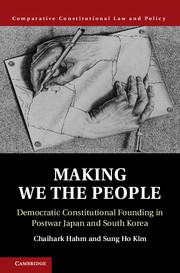18 results
3 - Constitutional Discourse on Human Dignity in South Korea
-
-
- Book:
- Human Dignity in Asia
- Published online:
- 26 July 2022
- Print publication:
- 15 September 2022, pp 62-86
-
- Chapter
- Export citation
6 - Constitutional Court of Korea
-
-
- Book:
- Constitutional Courts in Asia
- Published online:
- 17 September 2018
- Print publication:
- 20 September 2018, pp 141-167
-
- Chapter
- Export citation
3 - The Ghost of Empire Past
-
- Book:
- Making We the People
- Published online:
- 05 December 2015
- Print publication:
- 10 December 2015, pp 128-196
-
- Chapter
- Export citation
Index
-
- Book:
- Making We the People
- Published online:
- 05 December 2015
- Print publication:
- 10 December 2015, pp 309-316
-
- Chapter
- Export citation
Bibliography
-
- Book:
- Making We the People
- Published online:
- 05 December 2015
- Print publication:
- 10 December 2015, pp 289-304
-
- Chapter
- Export citation
Dedication
-
- Book:
- Making We the People
- Published online:
- 05 December 2015
- Print publication:
- 10 December 2015, pp vii-viii
-
- Chapter
- Export citation
1 - The Unbearable Lightness of the People
-
- Book:
- Making We the People
- Published online:
- 05 December 2015
- Print publication:
- 10 December 2015, pp 13-65
-
- Chapter
- Export citation
Note on Romanization and Sources
-
- Book:
- Making We the People
- Published online:
- 05 December 2015
- Print publication:
- 10 December 2015, pp 287-288
-
- Chapter
- Export citation
Conclusion
-
- Book:
- Making We the People
- Published online:
- 05 December 2015
- Print publication:
- 10 December 2015, pp 275-286
-
- Chapter
- Export citation
Contents
-
- Book:
- Making We the People
- Published online:
- 05 December 2015
- Print publication:
- 10 December 2015, pp ix-x
-
- Chapter
- Export citation
Glossary
-
- Book:
- Making We the People
- Published online:
- 05 December 2015
- Print publication:
- 10 December 2015, pp 305-308
-
- Chapter
- Export citation
2 - War and Peace
-
- Book:
- Making We the People
- Published online:
- 05 December 2015
- Print publication:
- 10 December 2015, pp 66-127
-
- Chapter
- Export citation
Copyright page
-
- Book:
- Making We the People
- Published online:
- 05 December 2015
- Print publication:
- 10 December 2015, pp vi-vi
-
- Chapter
- Export citation
4 - A Room of One’s Own
-
- Book:
- Making We the People
- Published online:
- 05 December 2015
- Print publication:
- 10 December 2015, pp 197-274
-
- Chapter
- Export citation
Introduction
-
- Book:
- Making We the People
- Published online:
- 05 December 2015
- Print publication:
- 10 December 2015, pp 1-12
-
- Chapter
- Export citation
Acknowledgements
-
- Book:
- Making We the People
- Published online:
- 05 December 2015
- Print publication:
- 10 December 2015, pp xi-xii
-
- Chapter
- Export citation

Making We the People
- Democratic Constitutional Founding in Postwar Japan and South Korea
-
- Published online:
- 05 December 2015
- Print publication:
- 10 December 2015
1 - Constitutionalism, Confucian Civic Virtue, and Ritual Propriety
-
-
- Book:
- Confucianism for the Modern World
- Published online:
- 28 August 2009
- Print publication:
- 08 September 2003, pp 31-53
-
- Chapter
- Export citation

